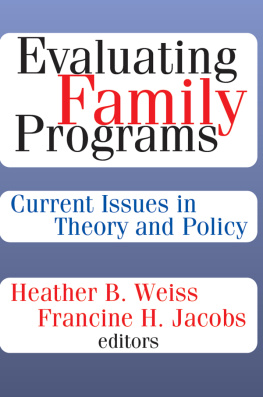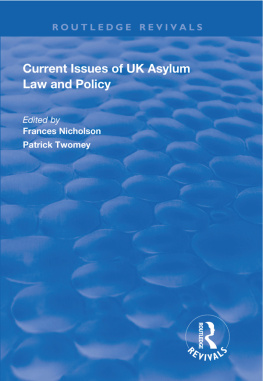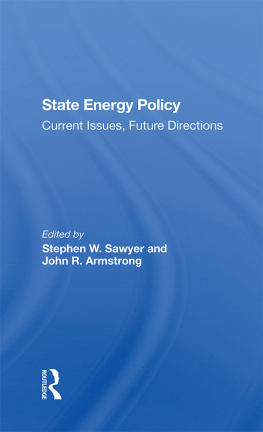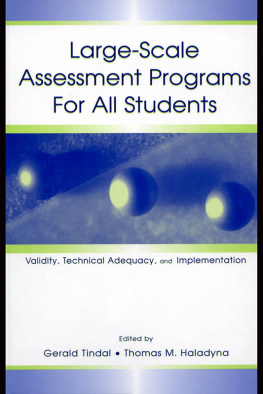Evaluating
Family
Programs
Current Issues in
Theory and Policy
Heather B. Weiss
Francine H. Jacobs
editors
First published 1988 by Transaction Publishers
Published 2017 by Routledge
2 Park Square, Milton Park, Abingdon, Oxon OX14 4RN
711 Third Avenue, New York, NY 10017, USA
Routledge is an imprint of the Taylor & Francis Group, an informa business
Copyright 1988 by Heather B. Weiss and Francine H. Jacobs.
All rights reserved. No part of this book may be reprinted or reproduced or utilised in any form or by any electronic, mechanical, or other means, now known or hereafter invented, including photocopying and recording, or in any information storage or retrieval system, without permission in writing from the publishers.
Notice:
Product or corporate names may be trademarks or registered trademarks, and are used only for identification and explanation without intent to infringe.
Library of Congress Catalog Number: 2008005497
Library of Congress Cataloging-in-Publication Data
Evaluating family programs: current issues in theory and policy / [edited by]
Heather B. Weiss and Francine H. Jacobs.
p. cm.
Originally published: New York: A. de Gruyter, c1988.
Includes bibliographical references and index.
ISBN 978-0-202-36215-1 (alk. paper)
1. Family social workUnited StatesEvaluation. 2. Child welfare
United StatesEvaluation. 3. Aid to families with dependent
children programsUnited StatesEvaluation. 4. Evaluation research
Social action programs)United States. I. Weiss, Heather Bastow.
II. Jacobs, Francine Helene.
HV699.E85 1988
362.8280973dc22
2008005497
ISBN 13: 978-0-202-36215-1 (pbk)
Publishers Note
The publisher has gone to great lengths to ensure the quality of this book but points out that some imperfections from the original may be apparent.
To Our Families
George & Barbara Bastow and John & Amity Weiss
Miriam & Albert Jacobs and Barry, Jessica, & Gabriel Dym
CONTENTS
Honorable George Miller
James K. Whittaker
Heather B. Weiss and Francine H. Jacobs
Heather B. Weiss
Francine H. Jacobs
Penny Hauser-Cram and Jack P. Shonkoff
Gail A. Howrigan
Carole C. Upshur
Deborah Klein Walker and Ruth W. Crocker
Marty Wyngaarden Krauss
Paul D. Cleary
Terrence Tivnan
David Olds
Douglas R. Powell
Gloria C. Rodriguez and Carmen P. Cortez
Ann Ellwood
Carl J. Dunst and Carol M. Trivette
James T. Bond and Robert Halpern
Shelby H. Miller
Marrit J. Nauta and Kathryn Hewett
Deborah Klein Walker and Anita M. Mitchell
Karl R. White
Penny Hauser-Cram
Diana T. Slaughter
Barry Dym
Francine H. Jacobs and
Heather B. Weiss
Carole C. Upshur
The diverse composition of American families, and the changing ways of raising our children, have become subjects of intense scrutiny by researchers and policymakers in recent years. Shifting demographics and work patterns, growing numbers of women in the work force, teenage pregnancy, single-parent families, and the deinstitutionalization of the elderly, disabled, and mentally illall these trends significantly affect family life.
The two-parent family, with one breadwinner and one homemaker, which was regarded as the norm when todays young parents grew up, is now atypical of most families. One in five children now lives in a single-mother home; in the majority (61%) of families with children under the age of 16, there is either a single parent or two working parents; 22% of all children born in 1985 were born to an unwed mother; 21% of American children (13 million) live below the poverty line.
Accompanying these demographic changes have been grave stresses, and the emergence of heightened demands for often inadequate supportive services. The House Select Committee on Children, Youth, and Families was created in 1983 to ascertain for policymakers the nature of the changes affecting Americas families, and to weigh public policies in response to those needs. In nearly 50 hearings, we have heard poignant accounts of futile searches for affordable, quality child care, research about the pressures of caring for multiply handicapped children, and the dramatic impact of a pregnancy on the life of an adolescent.
While parents, policymakers, and researchers share common aspirations for familieseconomic security, emotional stability, opportunitythese profound changes in family life have been accompanied by a growing divisiveness about the appropriate nature of public and private involvement in supporting families. The extensive research reviewed by the Select Committee demonstrates conclusively that calls for self-reliance on the part of overburdened families, and volunteerism on the part of charities and the overextended private sector, cannot match the beneficial outcomes attributed to well-designed and conscientiously operated programs supported jointly by the community, the private sector (including charities and religious organizations), and government.
Increasingly, legislators, social service providers, and program administrators have come to rely upon program evaluation as a guide in their attempts to recognize needs and to provide services to meet them. In recognition of the need for high-quality evaluation resources for family support programs, the Harvard Family Research Project has collected a broad range of experiences and recommendations from child and family specialists, program directors, and evaluation experts.
The resulting volume, Evaluating Family Programs, effectively bridges the gap between researchers and practitioners in order to bring practical, understandable advice to the providers of family programs, and to program funders and policymakers. The authors have moved outside the traditional approaches of their disciplines to create new models for delivering and evaluating services. This volume sets a mood of genuine inquiry and excitement about successful aspects of programs while maintaining openness about the limitations of both research and practice.
Evaluating Family Programs










